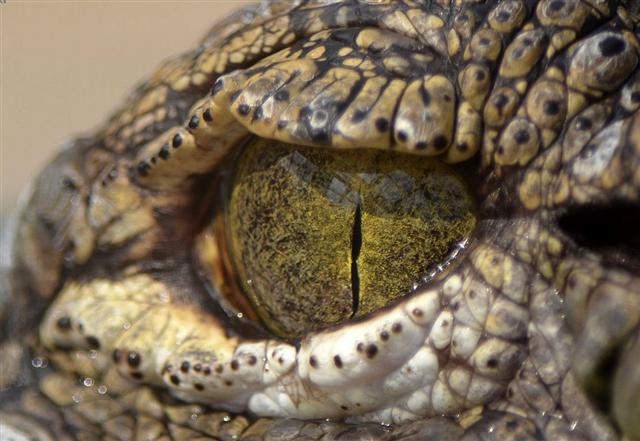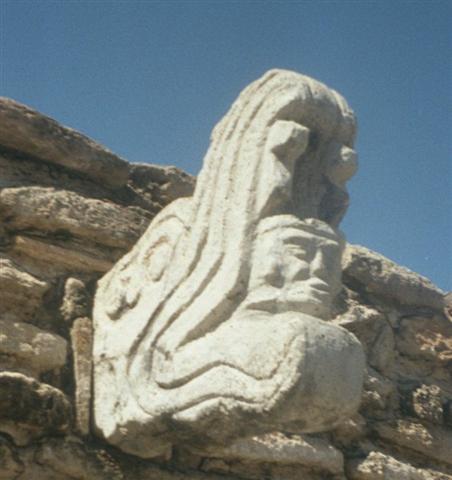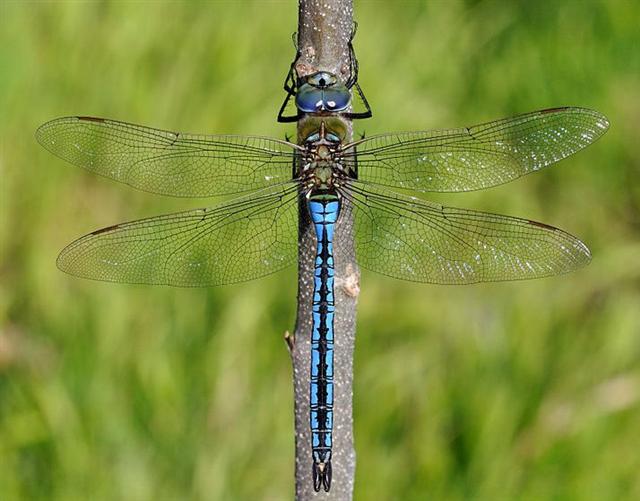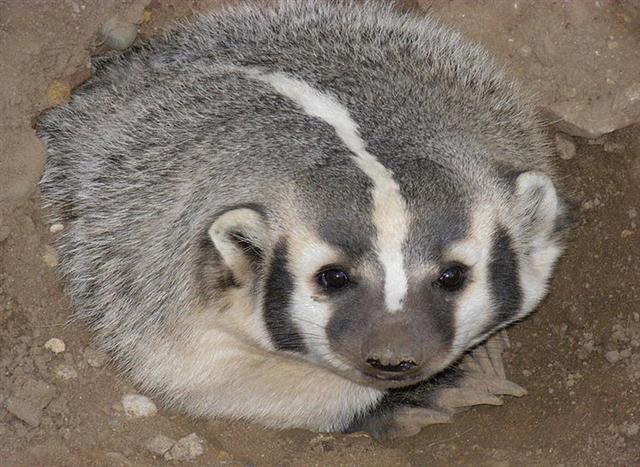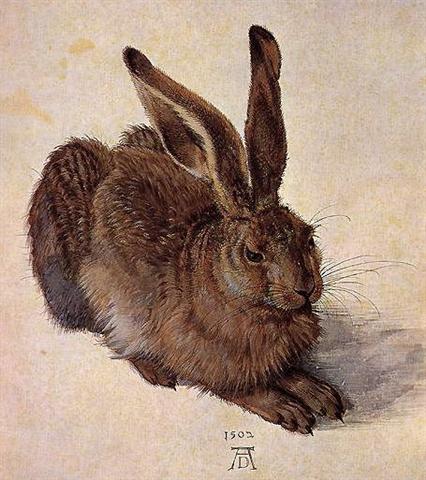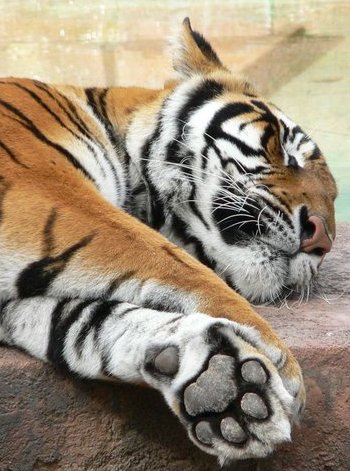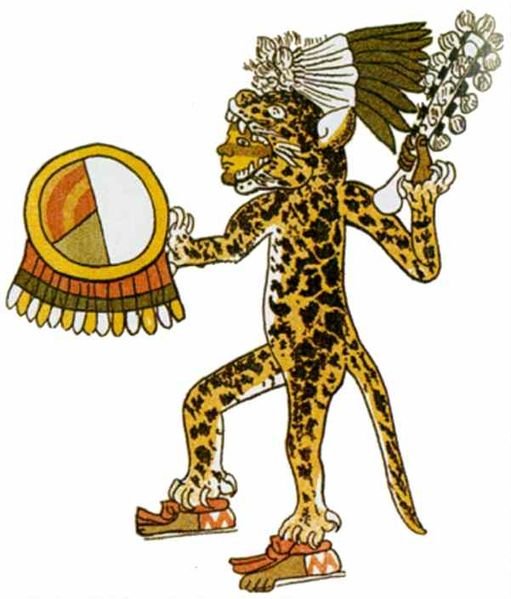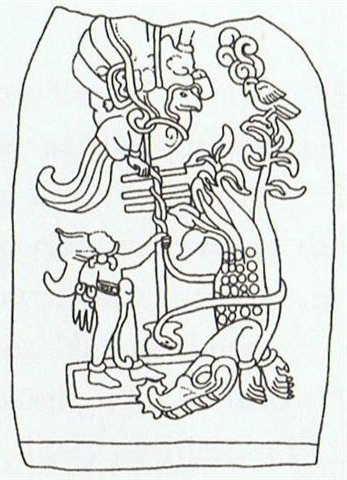Let's go back before we are completely lost. Teke (the Occiput) stole 39 variants of water yam roots from his brother Ma'eha, leaving the positions of Adhil and Mira in peace. But 39 variants were Stolen! (Gouyo!):
... All was now ready for departure except that there was no fire in the smithy. The ancestor slipped into the workshop of the great Nummo, who are Heaven's smiths, and stole a piece of the sun in the form of live embers and white-hot iron. He seized it by means of a 'robber's stick' the crook of which ended in a slit, open like a mouth. He dropped some of the embers, came back to pick them up, and fled towards the granary; but his agitation was such that he could no longer find the entrances. He made the round of it several times before he found the steps and climbed onto the flat roof, where he hid the stolen goods in one of the skins of the bellows, exclaiming: 'Gouyo!', which is to say. 'Stolen!'. The word is still part of the language, and means 'granary'. It is a reminder that without the fire of the smithy and the iron of hoes there would be no crops to store ...
Ma'eha. Brightness, bright, to lighten, to brighten up; ku ma'eha-á, it has already lightened up. Vanaga. 1. Light, brightness; to shine, to be bright, to glimmer, to glow; maeha mahina, moonshine; maeharaa, sunrise. Maehamaeha, bright. Hakamaeha, to brighten. Mq.: maeoeo, bright, transparent. 2. To get out of the way. 3. Thin, slender, slight. Churchill. ... They all sat down and rested [on the plain of Oromanga], when suddenly they saw that a turtle had reached the shore and had crawled up on the beach. He [Ira] looked at it and said, 'Hey, you! The turtle has come on land!' He said, 'Let's go! Let's go back to the shore.' They all went to pick up the turtle. Ira was the first one to try to lift the turtle - but she didn't move. Then Raparenga said, 'You do not have the necessary ability. Get out of my way so that I can have a try!' Raparenga stepped up and tried to lift the turtle - but Raparenga could not move her. Now you spoke, Kuukuu: 'You don't have the necessary ability, but I shall move this turtle. Get out of my way!' Kuukuu stepped up, picked up the turtle, using all his strength. After he had lifted the turtle a little bit, he pushed her up farther. No sooner had he pushed her up and lifted her completely off the ground when she struck Kuukuu with one fin. She struck downward and broke Kuukuu's spine ...
After that the stone statue named Te Takapau was stolen by Oti and Bara Henga from the inside of the house of Ma'eha [E:61]. Taka, takataka. Circle; to form circles, to gather, to get together (of people). Vanaga. 1. A dredge. P Mgv.: akataka, to fish all day or all night with the line, to throw the fishing line here and there. This can only apply to some sort of net used in fishing. We find in Samoa ta'ā a small fishing line, Tonga taka the short line attached to fish hooks, Futuna taka-taka a fishing party of women in the reef pools (net), Maori takā the thread by which the fishhook is fastened to the line, Hawaii kaa in the same sense, Marquesas takako a badly spun thread, Mangareva takara a thread for fastening the bait on the hook. 2. Ruddy. 3. Wheel, arch; takataka, ball, spherical, round, circle, oval, to roll in a circle, wheel, circular piece of wood, around; miro takataka, bush; haga takataka, to disjoin; hakatakataka, to round, to concentrate. P Pau.: fakatakataka, to whirl around. Mq.: taka, to gird. Ta.: taa, circular piece which connects the frame of a house. Churchill. Takai, a curl, to tie; takaikai, to lace up; takaitakai, to coil. P Pau.: takai, a ball, to tie. Mgv.: takai, a circle, ring, hoop, to go around a thing. Mq.: takai, to voyage around. Ta.: taai, to make into a ball, to attach. Churchill. Pau. 1. To run out (food, water): ekó pau te kai, te vai, is said when there is an abundance of food or water, and there is no fear of running out. Puna pau, a small natural well near the quarry where the 'hats' (pukao) were made; it was so called because only a little water could be drawn from it every day and it ran dry very soon. 2. Va'e pau, clubfoot. Paupau: Curved. Vanaga. 1. Hakapau, to pierce (cf. takapau, to thrust into). Pau.: pau, a cut, a wound, bruised, black and blue. 2. Resin. Mq.: epau, resin. Ta.: tepau, gum, pitch, resin. (Paupau) Hakapaupau, grimace, ironry, to grin. 3. Paura (powder), gunpowder. 4. Pau.: paupau, breathless. Ta.: paupau, id. 5. Ta.: pau, consumed, expended. Sa.: pau, to come to an end. Ma.: pau, finished. 6. Ta.: pau, to wet one another. Mq.: pau, to moisten. Churchill. Paua or pāua is the Māori name given to three species of large edible sea snails, marine gastropod molluscs which belong to the family Haliotidae (genus Haliotis), known in the USA as abalone, and in the UK as ormer shells ... Wikipedia
Oti. To come to an end; to suffice, to be enough: ku-oti-á, it is finished; ina kai oti mo kai, there is not enough to eat; he-oti á, there isn't anymore left, it's the last one; it's enough with that. Vanaga. Ta.: 1. Oti, presage of death. Sa.: oti, to die. 2. To cut. Mq.: koti, oti, id. Sa.: 'oti, id. Ma.: koti, id. Churchill. Para. 1. Spleen. 2. Ripe; to ripen: maîka para, ripe bananas; para rautí said of ripe bananas the peel of which has stayed green. 3. To start rotting (of wood and other materials): ku-para-á te miro, the wood has rotted. 4. A moss found in abundance in the watery bottom of Rano Kau, which has very long roots laden with water. Fishermen used to take quantities of them, wrapped in banana leaves, to alleviate their thirst. Vanaga. 1. A short club T. Mq.: parahua, a paddle-shaped club. 2. To become bad, to soften, to decay, to rot, to ripen, old, used up.; niho para, decayed teeth; para rakerake, overripe; tae para, unripe. Hakapara, to mellow. P Mgv.: para, ripe, mature; akapara, to ripen, to improve morally. Mq.: paá, ripe, soft, overripe, rotten, old, used up. Ta.: para, ripe. 3. Spleen. Churchill. Hega. Hegahega, reddish, ruddy. Hehega, to dawn; ki hehega mai te raá, when the sun rises. Vanaga. Hehegaraa, sunrise. PS Sa.: sesega, to be dazzled as by the sun. Fu.: sega, the beginning of daybreak. Niuē: hegahega, the red light or rays at sunset. Viti: sesē, to dawn. Churchill. This stone statue was carried on a stretcher (tupatupa) to be the first item brought onboard the Royal Double Canoe, and she had been fetched from the middle of the yam plantation - i.e. at Adhil, where the Middle Star Pillar, Ana-roto, was at the Full Moon. Here Adhil (the star ξ Andromedae - between her legs) and Spica (α Virginis) formed a pair of opposites, one of them together with the Sun during the winter (Hine-takurua) and the other during summer (Hine-takurua):
... Hamiora Pio once spoke as follows to the writer: 'Friend! Let me tell of the offspring of Tangaroa-akiukiu, whose two daughters were Hine-raumati (the Summer Maid - personified form of summer) and Hine-takurua (the Winter Maid - personification of winter), both of whom where taken to wife by the sun ... Now, these women had different homes. Hine-takurua lived with her elder Tangaroa (a sea being - origin and personified form of fish). Her labours were connected with Tangaroa - that is, with fish. Hine-raumati dwelt on land, where she cultivated food products, and attended to the taking of game and forest products, all such things connected with Tane ... This (*19 = day 99 = April 9) was also the place where Mae'ha had enumerated all the names of the stolen violet yams. First to be mentioned were 10 varieties of he tara uhi: Tara. 1. Thorn: tara miro. 2. Spur: tara moa. 3. Corner; te tara o te hare, corner of house; tara o te ahu, corner of ahu. Vanaga. (1. Dollar; moni tara, id.) 2. Thorn, spike, horn; taratara, prickly, rough, full of rocks. P Pau.: taratara, a ray, a beam; tare, a spine, a thorn. Mgv.: tara, spine, thorn, horn, crest, fishbone. Mq.: taá, spine, needle, thorn, sharp point, dart, harpoon; taa, the corner of a house, angle. Ta.: tara, spine, horn, spur, the corner of a house, angle. Sa.: tala, the round end of a house. Ma.: tara, the side wall of a house. 3. To announce, to proclaim, to promulgate, to call, to slander; tatara, to make a genealogy. P Pau.: fakatara, to enjoin. Mq.: taá, to cry, to call. 4. Mgv.: tara, a species of banana. Mq.: taa, a plant, a bird. Ma.: tara, a bird. 5. Ta.: tara, enchantment. Ma.: tara, an incantation. 6. Ta.: tara, to untie. Sa.: tala, id. Ha.: kala, id. Churchill. Dioscorea alata, called water yam, winged yam, and purple yam, was first cultivated somewhere in Southeast Asia. Although it is not grown in the same quantities as the African yams it has the largest distribution world-wide of any cultivated yam, being grown in Asia, the Pacific islands, Africa, and the West Indies (Mignouna 2003). In the United States it has become an invasive species in some Southern states. In the Philippines it is known as ube (or ubi) and is used as an ingredient in many sweet desserts. In India, it is known as ratalu or violet yam or the Moraga Surprise. In Hawaii it is known as uhi. Uhi was brought to Hawaii by the early Polynesian settlers and became a major crop in the 1800s when the tubers were sold to visiting ships as an easily stored food supply for their voyages ...
... 'The first one Tara Kura of Maeha and Teke.' That's what it was (the variety of yam), that which was (being put) in the basket for the benefit of Teke, until the basket was completely filled with yams (ka titi ro). They tied up the first basket [he here te taropa rae] and continued in the same manner (? pera no, pera no) until all (? ka paepae tahi ro) the baskets were filled with yams ... [E:62] Kura. 1. Also: poukura, the short, thin, multicoloured feathers of chickens and other birds. 2. The best of something, choice. Vanaga. Tutui kura, shawl. Kurakura, fair, light. Hakakurakura, to make to blush. P Pau.: kurakura, red, violet. Mgv.: kurakura, red, yellow, scarlet. Mq.: uáuá, red, ruddy. Ta.: uraura, red. Churchill. Hue. To congregate, to get together; huega, meeting, reunion of persons, heap, pile of things; hue hau, ball of string. Huehue, a fish, with a round body, dark back, and light belly. Vanaga. 1. Calabash, gourd, pumpkin, pot, vase. P Pau.: hue, gourd. Mgv.: hue, calabash gourd. Mq.: hue maoi, calabash; hue ákau, pumpkin; hue, every sort of vase with a large aperture. Ta.: hue, gourd, bottle. 2. A pile, a heap; to accumulate, to agglomerate, to amass, to heap up, to collect, to charge, to put in charge, to destine, to consider, to camp, to pile up, to mass, to assemble, to conceal, to reunite; hue ke, to choose; hue no, a halt; hue ki ruga, to put on another; hakahue, to heap up, to amass, to assemble; huega, mass, sheepfold, camp, collection, company, society, council, corporation, faculty, crowd, group, leage. Mgv.: hue, to collect, to gather together, to heap up. Mq.: huevaevae, calf of the leg; huefenua, the terrestrial globe. Ta.: hue, to heap up. Churchill. Pau.: 1. Emotion. Ta.: huehue, to show fear. 2. To carry, to conduct. Mgv.: akahue, to carry a crop of foodstuff. Churchill. Mgv.: A fish. Ta.: huehue, id. Mq.: huehue-kava, id. Sa.: sue, id. Churchill. And then followed 29 varieties with other names [E:62-64]. The last of them with the name he ravi pako was 22 days after Adhil / Spica at the place of Bharani / Zuben Elgenubi. Aquired from the theft were three hundred [etoru te rau] baskets of uhi.
In the Dogon language of Ogotemmêli
the important word gouyo meant not only 'stolen' but also 'granary', the place where the crops of food were 'piled up':
... Behind me, towering almost 100 feet into the air, was a perfect ziggurat, the Temple of Kukulkan. Its four stairways had 91 steps each. Taken together with the top platform, which counted as a further step, the total was 365. This gave the number of complete days in a solar year. In addition, the geometric design and orientation of the ancient structure had been calibrated with Swiss-watch precision to achieve an objective as dramatic as it was esoteric: on the spring and autumn equinoxes, regular as clockwork, triangular patterns of light and shadow combined to create the illusion of a giant serpent undulating on the northern staircase ... All the items stored onboard the Royal Double Canoe were thus in principle the same - viz. stolen sources of food. ... the Hawaiian staple, taro, is the older brother of mankind, as indeed all useful plants and animals are immanent forms of the divine ancestors - so many kino lau or 'myriad bodies' of the gods. Moreover, to make root crops accessible to man by cooking is precisely to destroy what is divine in them: their autonomous power, in the raw state, to reproduce ... Counting from Te Taka-pau (Sirrah, The Navel of the Horse) there were all kinds of variants of roots. And for these, of course, a digging stick had to be used. ... They went ashore and took the food [te kai] with them. They pulled the canoe onto the beach and left it there. Ira sat down [he noho] with all the other (companions) and spoke to Makoi [ka ki era kia Makoi]: 'You shall mark the land for me and make it known (by its name)!' After that, Ira spoke these words: 'This is the diggning stick (? ko koko], Kuukuu. You shall work the land for me and plant the yam roots [te uhi]!' ... [E:18]
... Man, then, lives by a kind of periodic deicide. Or, the god is separated from the objects of human existence by acts of piety that in social life would be tantamount to theft and violence - not to speak of cannibalism. 'Be thou undermost, / While I am uppermost', goes a Maori incantation to the god accompanying the offering of cooked food; for as cooked food destroys tabu, the propitiation is at the same time a kind of pollution - i.e., of the god. The aggressive relation to divine beings helps explain why contact with the sacred is extremely dangerous to those who are not themselves in a tabu state. Precisely, then, these Polynesians prefer to wrest their existence from the god under the sign and protection of a divine adversary. They put on Tuu (Kuu), god of warriors. Thus did men learn how to oppose the divine in its productive and peaceful aspect of Rongo (Lono). In their ultimate relations to the universe, including the relations of production and reproduction, men are warriors ...
On Easter Island the stars in April would have been visible in the night because this month corresponded to the dark month numbered 4 + 6 = 10 (October) north of the equator, and therefore daylight had faded. At the foot of Aldebaran was the place for (black) tattooing - at which time Antares would have been seen in the night. ... He continued travelling until he reached the house of Uetonga, whose name all men know: he was the tattoo expert of the world below, and the origin and source of all the tattoo designs in this world. Ue. Uéué, to move about, to flutter; he-uéué te kahu i te tokerau, the clothes flutter in the wind; poki oho ta'e uéué, obedient child. Vanaga. 1. Alas. Mq.: ue, to groan. 2. To beg (ui). Ueue: 1. To shake (eueue); kirikiri ueue, stone for sling. PS Pau.: ueue, to shake the head. Mq.: kaueue, to shake. Ta.: ue, id. Sa.: lue, to shake, To.: ue'í, to shake, to move; luelue, to move, to roll as a vessel in a calm. Niuē: luelue, to quake, to shake. Uvea: uei, to shake; ueue, to move. Viti: ue, to move in a confused or tumultous manner. 2. To lace. Churchill. Toga. 1. Winter season. Two seasons used to be distinguished in ancient times: hora, summer, and toga, winter. 2. To lean against somehing; to hold something fast; support, post supporting the roof. 3. To throw something with a sudden movement. 4. To feed oneself, to eat enough; e-toga koe ana oho ki te aga, eat well first when you go to work. Vanaga. 1. Winter. P Pau., Mgv.: toga, south. Mq.: tuatoka, east wind. Ta.: toa, south. 2. Column, prop; togatoga, prop, stay. Togariki, northeast wind. Churchill. Wooden platform for a dead chief: ka tuu i te toga (Bb8-42), when the wooden platform has been erected. Barthel 2. The expressions Tonga, Kona, Toa (Sam., Haw., Tah.), to indicate the quarter of an island or of the wind, between the south and west, and Tokelau, Toerau, Koolau (Sam., Haw., Tah.), to indicate the opposite directions from north to east - expressions universal throughout Polynesia, and but little modified by subsequent local circumstances - point strongly to a former habitat in lands where the regular monsoons prevailed. Etymologically 'Tonga', 'Kona', contracted from 'To-anga' or 'Ko-ana', signifies 'the setting', seil. of the sun. 'Toke-lau', of which the other forms are merely dialectical variations, signifies 'the cold, chilly sea'. Fornander. Uetonga was at work tattooing the face of a chief. This chief was lying on the ground with his hands clenched and his toes twitching while the father of Niwareka worked at his face with a bone of many sharpened points, and Mataora was greatly surprised to see that blood was flowing from the cheeks of that chief. Mataora had his own moko, it was done here in the world above, but it was painted on with ochre and blue clay. Mataora had not seen such moko as Uetonga was making, and he said to him, 'You are doing that in the wrong way, O old one. We do not do it thus.' 'Quite so,' replied Uetonga, 'you do not do it thus. But yours is the way that is wrong. What you do above there is tuhi, it is only fit for wood. You see,' he said, putting forth his hand to Mataora's cheek, 'it will rub off.' And Uetonga smeared Mataora's make-up with his fingers and spoiled its appearance. And all the people sitting round them laughed, and Uetonga with them ...
The Winter Hexagon was visible in the nights of the northern winter, whereas in the southern winter it was the opposite side of the sky with Antares which caught the imagination:
... The Hawaiians also called the Milky Way Kuamoo, Backbone of the Lizard. Many Polynesian names for the Milky Way may be reminiscent of the crocodiles of Western Melanesia, the moko-roa, 'long lizards' of legend, for the same motif is found in various parts of the Pacific. The Tuamotuans termed the Milky Way Vaero-o-te-moko, Tail of the Lizard, and Mango-roa, Long Shark. The Mangaian name Moko-roa-i-ata, Long-lizard-of-morning, not only sounds the lizard or crocodile note but also refers to the method of determining the small hours of the night before the rising of the morning star. The Maori used the same term contracted to Mokoroiata. Again they called the Galaxy Mango-roa, Long Shark, and Mangoroiata, Long-shark-of-dawn ...
The robber's stick of the ancestor smith could possibly have referred to that slit in the Milky Way where Cygnus was on one side and Aquila on the other:
The tattooing of chiefs at the foot of Aldebaran suggests the Underworld (Tonga), for down there they were masters of this art. The word moko meant both tattoo and crocodile.
The Chinese began their list with the Crocodile: ... For 'f Sag' (at the 8th station)
I guessed the meaning was φ Sagittarii, based on its
sound value. In my
uncertainty I looked for support in the G text and
found φ Sagittarii precisely 284.0 days after
equinox, in day 364 ...
|
||||||||||||||||||||||||||||||||||||||||||||||||||||||||||||||||||||||||||||||||||||||||||||||||||||||||||||||||||||||||||||||||||||||||||



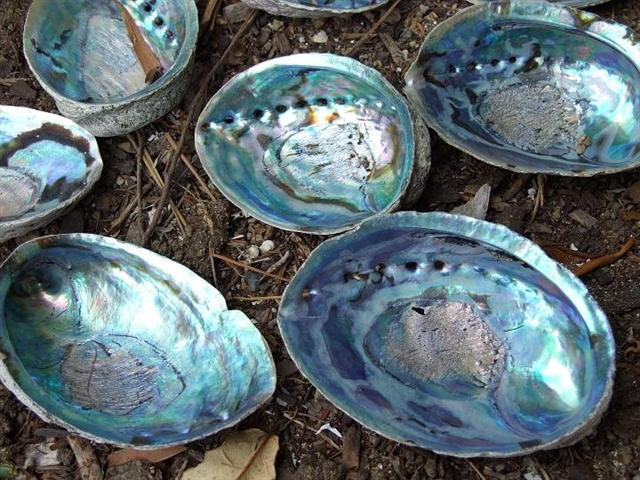


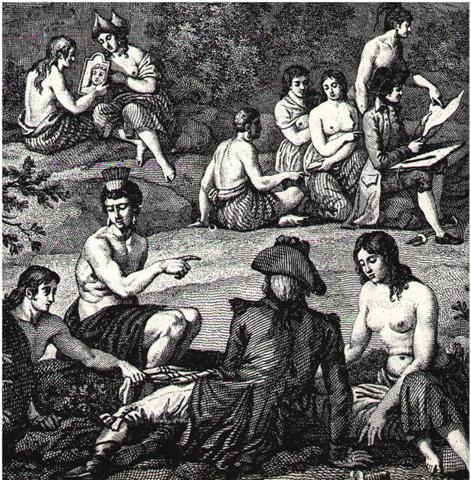
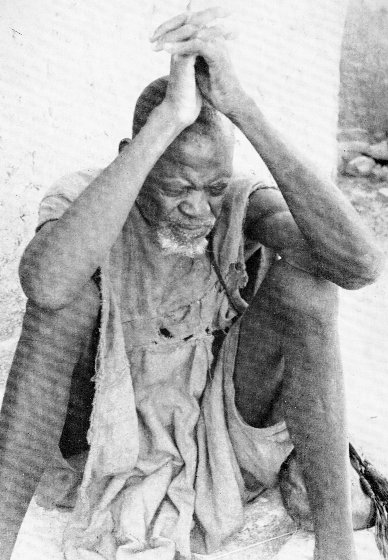
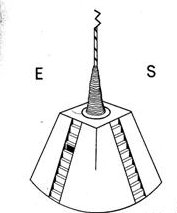
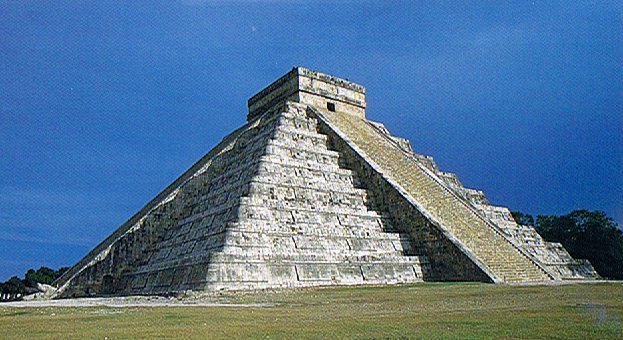
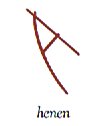
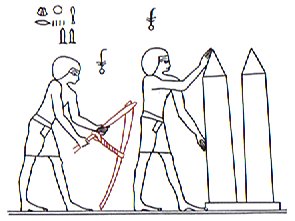
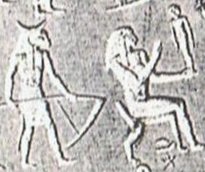

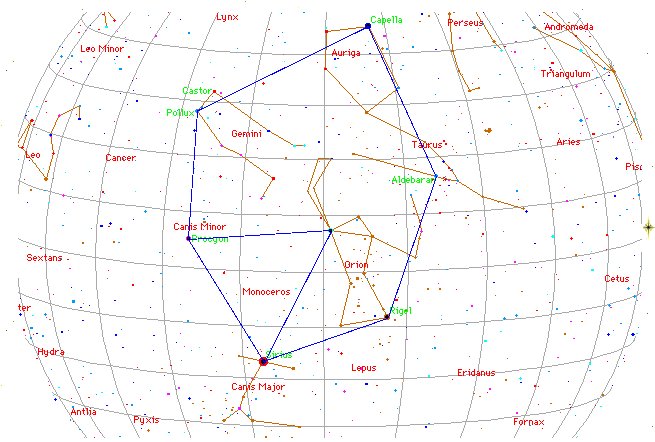
.jpg)

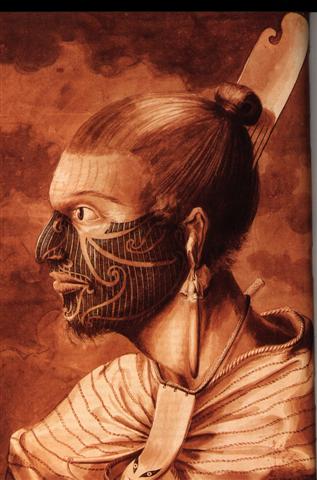
.jpg)
